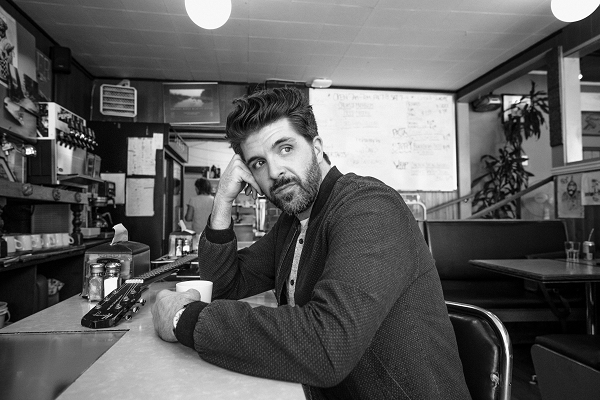Last month saw the release of Scotty Hills’ latest EP, “Nature Girl,” a tour de force both musically and lyrically. Thoughtful and deep lyrics define the album, which also finds Hills exploring a variety of musical genres, focusing even more on the acoustic folk side of his talent than in his previous album, “Year of Septembers.”
From the wistful “Hope You’re in Toronto,” which opens the album, to the closing track “Won’t Be Back” with its distinctive pedal steel and gentle swing, the album is a terrific listening experience to which I’ll be returning again and again.
Scotty Hills was kind enough to take some time to answer a few questions about “Nature Girl.”
Your music crosses a lot of musical genres – in listening to your previous release, “Year of Septembers,” I would characterize it as rooted in soul/blues, but with some jazz and folk mixed in. “Nature Girl” seems to me to be a continued exploration of the folk and acoustic sides of your writing, perhaps a little quieter overall than “Year of Septembers.” What specifically guided you in that direction for “Nature Girl”?
“Nature Girl” is kind of like, a modern man standing and witnessing his effect on the planet. From information overload, to the environmental elephants in the room. It’s more of a reflection on our relationship with our only tangible god, Mother Nature. Some call her Grandmother Nature. The last album was much more exploratory with genres and lyrical themes. This album is definitely a departure. For me this is a reflective five song collection which hints another full length, already in the works.
“Nature Girl” is meant to be calming and introspective. I hope listeners can relate to the theme of self reflection. I’m currently working on another handful of songs, which will further glue together a “sound.” Year of Septembers is very all over the place, with style and genre. The new material is more unified, making a stronger collective artistic statement. “Nature Girl” is a quick detour, for a walk by a quiet river, en route to the bigger picture.
One line of the press release for this album really intrigued me: “Listeners will hear an exploring songwriter, taking a deep look into the relationship between human nature and mother nature.” Per the last question, clearly you are unafraid to explore a variety of musical genres (and do so successfully), but I’m curious about how you see the relationship between human nature and mother nature – can you elaborate a bit on that?
I see a really thick line in the media, social media and otherwise. More than ever, we are divided by what we see on our phones. I see a lot of old, outdated industrial practices that have been poisoning water, destroying our forests, and polluting our air for far too long. At the same time, I want to reflect on my place and part in it all. I went to Detroit on a train while in the recording process. I was really interested in Detroit’s story. So much civic decay, but such resilient people. I was fascinated by the vast number of urban green spaces and gardens, amongst burnt out neighborhoods.
What are jobs without healthy food? What is money without balanced ecosystems? The title “Nature Girl” refers to how a cynical society views Mother Nature; as a little helpless girl. She gives, and we take, but it’s a mistake because in the end the little girl has more power than anyone’s ever known. But we can’t see it, because we’re too caught up in hyper consumption, fear campaigns, colonizing the moon, etc. “Nature Girl” is an offering to Mother Nature, while begging for her forgiveness. She also represents the feminine spirit, for which all men are in debt. So there are two themes that really are a metaphor for each other. At the same time, they are just a collection of individual songs.
I’ve listened to “The Answers” a number of times and I’m intrigued by it – not only by the metaphor of our lives as a “freshly dug garden” but in particular by the line about being followed by answers. I suspect that a number of us are followed around by questions as we seek their answers, but you’ve turned the metaphor on its head here. How do you see that interplay of questions and answers in life – which do you think we’re seeking, and which are seeking us?
I think the simple answers are right in front of us, but we don’t want to listen to them. They kind of hover over our head until we stop incessantly hunting them down. It’s about getting to enjoy the fleeting moments of clarity, and see that the simple answers are in the trees and in the dirt and the rain. I see popular science as a new religion, that often pacifies lessons hidden in nature. What if science is only capable of a singular paradigm? What if there is something bigger than we are able deduce through human ingenuity? What if the answers can’t be found in articles peer reviewed. What if we’ve thrown out our faith in mother nature, with the religious bathwater? The song is one big question, and it can only be answered when it’s our turn to go.

This album came in part from a long train trip between Seattle and Detroit – what are some ways in which that journey inspired this album?
It was very romantic, to travel to Motown on a train. I had so much time to think about what it would be like, and who I might meet. I knew I was in for a special time, because of my friend Tony Green’s role in the Detroit music community. Tony has been on so many classic albums, you just can’t count them all. What I didn’t know, is that Tony lived right across the street from Marvin Gaye’s house, where he shot the cover of “What’s Going On” in the backyard! It’s not every week, that I go without seeing someone of my own skin colour. So it was definitely a field trip. Tony treats everybody the same. If you’re hanging with him, you’re gonna go get lined up at the barber shop, and the barber will try to tell you about god. He will invite you on his porch for a “smoke” and tell you the whole story of Death Row Records, while you drink Tanqueray and orange juice. He’ll tell you about his years with George Clinton or Snoop Dog, or playing SNL with Tupac. He will prove to you, that he is Detroit’s ambassador.
Also, seeing the urban garden initiative, the green renewal projects, the downtown renewal, as well as some a lot of seedy bits, was more than inspirational.
Were there specific experiences from your time with the Perpetrators that have informed your career as a solo artist (positive, or maybe not so positive)?
I’ve always written songs and played my guitar, since I was 11 or twelve. I wrote my first song when I was 6 (“The Visit”). It was a great run that lasted 5 years, but drugs were creeping in more and more, and the direction was getting skewed. Sketchy managers, more drinking than creating. We made some really great music, but I was writing a lot of stuff that wasn’t going to fit with the band anyway. About a month after the split, I won a radio station contest and recorded Year of Septembers. The following year, the Perpetrators got nominated for a Juno Award and I went on that trip and had to bunk with my replacement. Awkward. Still, many many great memories with those fellas.
I know a tour announcement is forthcoming – any hints of whether you’ll be coming east or even south of the border into the US (we’re based in Pennsylvania)?
I’m working on a tour across Canada right now. I’m planning on going right to the East Coast. My next immediate tour plan, will include a U.S. run, from the North East corner, across and down to California, then up the west coast. I have been in talks with one of my favourite drummers of all time, who happens to live in Philadelphia. At this time he will remained unnamed, but he also tours with one of Philly’s favourite Acoustic/Soul sons. So with any luck, I’ll be in your neck of the woods this summer. I’ll be sure to keep you posted.
~ L
Photo credit: LeAnn Mueller


